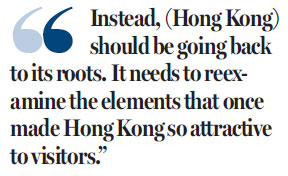Magic medicine for HK tourism
Updated: 2016-04-28 07:09
By Peter Liang(HK Edition)
|
|||||||||
Peter Liang argues that HK must reinvent itself as a unique and exciting tourist destination by reviving its past dominance of the cultural scene in the region
The downturn in tourist arrivals, particularly from the Chinese mainland, has been widely blamed for the downturn in retail sales, which, in turn, is pushing up the unemployment rate at a time when the economy is heading south.
Whatever the cause, this chain of events has sounded the alarm through the corridors of power. At stake are not only the hundreds of millions of dollars in tourist income and retail sales but, more importantly, the value of millions of square meters of retail space in the busy commercial districts, where some of the world's priciest properties are located.
While the influential business leaders and powerful landlords are blaming everything but their own greed for driving away big-spending tourists, the authorities responded in a characteristically bureaucratic fashion, and assigned a bigger budget to overseas promotion. This is not necessarily a bad idea. The question to ask is what to promote?
Even to the less-savvy tourists, Hong Kong is already well-known as a shopping paradise and culinary capital of the region. Other than that, it really has little else to offer. In recent years, its reputation for hospitality was eroded not so much by the occasional outbreak of violence toward mainland tourists, but rather by profiteering at the expense of unwary visitors.
No matter how big a budget the government cares to allocate, harping on about this old theme is not going to repair Hong Kong's image - hurt beyond recognition by the unbridled greed of many landlords, merchants and hoteliers. But all is not lost, according to Allan Zeman.

As the person widely credited for transforming a sleepy back street near Central to a world-class entertainment enclave, Zeman certainly knows a thing or two about image building, or rebuilding. He recently stepped down as chairman of Ocean Park after having presided over a revamp, which gave this crumbling entertainment enterprise a new lease of life.
In an interview with a mass-circulation Chinese-language daily newspaper, Zeman said the problem with Hong Kong is that it is no longer "cool". Indeed, Hong Kong has been hurt by years of self-doubt in the despairing search for an illusive new identity. It has been searching in all the wrong places, according to Zeman.
Instead, it should be going back to its roots. It needs to reexamine the elements that once made Hong Kong so attractive to visitors. Those elements, embodied in locally produced movies, television drama series and Cantonese music, were like flowers. They were nurtured by a creative culture, which has since been damaged by political infighting and social discontent.
Hong Kong's long dominance of the cultural scene in the region has been displaced by South Korea, which now appeals greatly to young people here and in many other Asian cities. But South Korea's tenure as the purveyor of chic is tentative at best. Not everyone feels that rearranging your face through multiple plastic surgeries - a penchant of many South Korean entertainers - is a good idea.
Financial Secretary John Tsang Chun-wah is widely seen to have done the right thing in helping, as Zeman noted, to make Hong Kong exciting again. Tsang has done this by setting aside a fund in the Budget to help finance local movie productions. Indeed Hong Kong's creativity, which blossomed so enchantingly in the 1980s and 1990s, was rooted in the thriving movie industry of the 1960s. Although crude by today's standards, these Cantonese movies nurtured a generation of creative talents who provided the driving force which catapulted Hong Kong films to great heights.
It is often said that there is no shortage of creative talent today in Hong Kong. But their creativity is stifled by investors' demands to cater to the diverse and sometimes conflicting tastes of audiences in various overseas markets. This is a challenge that creative talents in other regions, including South Korea, do not have to face.
Granted, the Hong Kong market is small. But it was even smaller in the past when people could still make money producing Cantonese movies and writing songs catering specifically to the local audience.
These were the things that made Hong Kong unique. If we could do it then, we should be able to do it now. The curtain for the second act - even grander than the first - is waiting to be lifted.
The author is a veteran current affairs commentator.
(HK Edition 04/28/2016 page10)